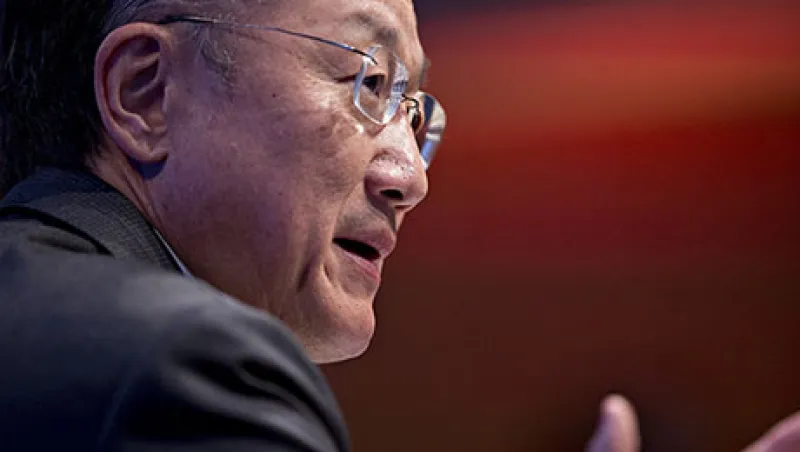World Bank president Jim Yong Kim and International Monetary Fund managing director Christine Lagarde agree on the outlook for the world economy: in a word, shaky.
The two top multilateral lenders both pared their forecasts for global growth this year in advance of their joint spring meetings, which are taking place in Washington through this weekend. The IMF, which counts in real dollars, dropped its projection to 3.2 percent from 3.4 percent in January. The World Bank, which calculates on the basis of estimated purchasing power, cut its forecast to 2.5 percent from 2.9 percent.
But in setting out their objectives for the meetings at news conferences on Thursday, the two leaders revealed contrasting personalities and ambitions for their institutions. Lagarde is a former French Economy and Finance minister with a commanding presence. She speaks in sound-biteable metaphors: her “three-pronged approach” to a more robust economy giving way only to the “two legs” of potential recovery for Greece.
Re-elected in February to a second five-year term at the IMF’s helm, Lagarde is redoubling her efforts to put the fund at the center of global economic policy. Echoing a warning she made on a recent trip to Europe, Lagarde told reporters that the threat of a so-called Brexit result in the U.K.’s June 23 referendum on European Union membership is steadily moving up her list of “downside risks.” She also reiterated her support for continued monetary stimulus from the world’s top central banks, pooh-poohing the rising objections from market watchers, that low and even negative interest rates are crippling savings.
“It’s natural that banks be concerned about their margins and profits,” she said. “But their depositors are not just savers. They are also consumers and employees who might see less employment without these policies.”
Lagarde also called on governments of unnamed developed-markets nations to loosen their budgetary wallets, seeing “fiscal space” to support a continuing sluggish post-2008 global recovery.
Kim is a South Korea–born, Iowa-raised physician who worked in neither politics nor finance before taking the World Bank job in 2012. Among other gigs, he’s taught at Harvard’s School of Public Health, headed the HIV/AIDS efforts of the World Health Organization and served as president of Dartmouth College. He is happy to be called Jim.
During the press conference, he stressed the World Bank’s role as an advocate and resource for the 700 million people across the world living in extreme poverty, defined as those earning less than $1.90 per day, and for the growing army of refugees and displaced persons fleeing conflicts in the Middle East and Africa. His rhetorical term of choice is “very concerned,” which he employed a dozen times in a 40-minute session.
Kim stressed a number of programs the bank is rushing into place in Jordan and Lebanon, two of the frontline states for the Syrian refugee crisis. In Jordan, the World Bank is backing the creation of special economic zones that he says will provide thousands of jobs for the newcomers and will be granted export privileges to Europe. In Lebanon, Kim’s institution aims to provide funds so that refugee children can go to school. Kim is also guiding the bank toward increased involvement in health care reform, starting with the People’s Republic. China and other developing countries are making the mistake of copying “very expensive, very technology-intensive systems” from the West, he said. The bank can help them find alternatives that he says “can be less costly with much better outcomes.”
All this takes money, however, Kim warned World Bank donor countries. “We have distributed more funds over the last three years than ever before in a noncrisis period. The IDA needs to be replenished,” he said, referring to the International Development Association, the bank arm that provides interest-free loans to the world’s poorest countries.
Aside from their worries about the world economy, Kim and Lagarde seem to have one more thing in common: confidence in the expanding future of their own institutions. Judging by the continued strength of the joint IMF and World Bank meetings as a draw for the world’s policy and media elite, that faith looks well founded.






